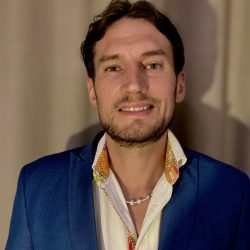David Monk, Gulu University (Uganda)
Research Project Title: Integrating Indigenous Knowledges in Engaged Scholarship
This community-based participatory research project revolves around the "Wang Oo" (campfire) speaker series, which aims to bridge knowledge differences by engaging academics and the community to explore the value and innovations of Indigenous Knowledge Systems (IKS) in the various faculties related to peace, gender, technology, development, education, economics, and law at Gulu University. The project seeks to understand how these sessions can inform community-university partnerships, shape academic programs, and further community-based participatory research initiatives at the university. This research is an initiative of the UNESCO Knowledge for Change (K4C) hub at Gulu, which conducts and promotes knowledge democracy and community based research. The hub is composed of both Gulu University and diverse community members, and builds on previous initiatives which initiated discourse on herbal medicine at Gulu University.
The engaged research grant will support the extension of these knowledge bridging attempts across the university and inform strategies to integrate IKS and healthy community partnerships more deeply in the fabric of the university. In an initial phase, the research team will plan and design the "Wang Oo" speaker series sessions. These gatherings will bring together academic faculty, students, and community members in a manner inspired by the traditional "Wang Oo" campfire circles used in the local Acholi culture for shared learning and debate. The sessions are designed to create a dynamic space for bridging knowledge differences and exploring the depth and potential of Indigenous Knowledge Systems in the fields of peace, gender, technology, development, education, economics, and law. Each session will be designed to promote academic debate around a different theme, and included discussion questions related to the overarching research question: How to better integrate Indigenous Knowledges, innovations and research in all programs at Gulu University. The series will be co-created to maximise its strategic engagement with key stakeholders.
The sessions will take place on a monthly basis at the Gulu University Herbal medicine, biodiversity garden and cultural centre. They will be livestreamed online and recorded. The research approach uses the local Acholi "Wang Oo" approach to engagement, research, and teaching. The process includes the use of dance, storytelling, and debate to collaboratively identify relevant issues in the community, and develop and decide on strategies to address them. The process includes presentations by relevant experts and open discussions in a circle around the fire. When a consensus is agreed on, food is shared by all. Simultaneously, there will be a continuous assessment of how these sessions engage faculty and community in the knowledge bridging process, and inform community-university partnerships, academic programs, and community-based research initiatives at Gulu University. In each session, in addition to the topic specific field of discourse (peace, education, gender, etc..) participants will be asked to collaboratively reflect on, analyse, and identify strategies for integrating IKS at Gulu University. The research process itself, through the Wang Oo, is an act and demonstration of bridging knowledge cultures. It is an iterative process that will build on itself. This research project serves as a community-driven endeavor to bridge the gap between Indigenous Knowledge Systems and academic programs, creating meaningful connections between Indigenous knowledge keepers, community leaders, and university faculty. It embodies the principles of community-based participatory research and highlights the potential of the "Wang Oo" speaker series to inform and transform community-university relationships, academic programs, and community-based research initiatives at Gulu University.
